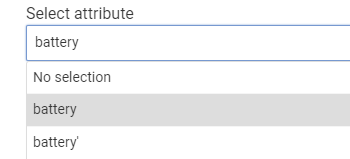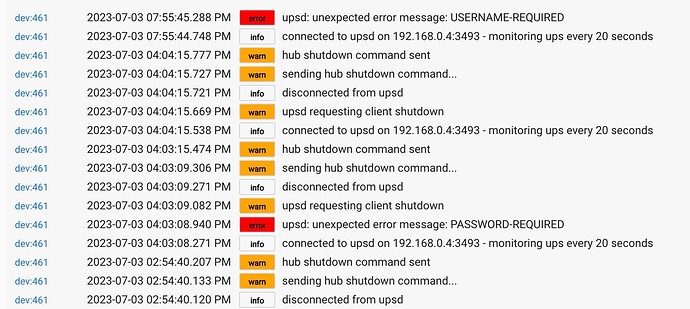This worked fine with my Makelsan UPS and NUT installed on raspberry PI (raspbian)
I made some additions to the driver.
Added button for beeper toggle.
And some attributes for power meter, temperature measurement, battery features.
here's my copy:
metadata {
definition(
name: "NUT upsmon driver", namespace: "cococafe", author: "Denny Page",
importUrl: "https://raw.githubusercontent.com/dennypage/hubitat/master/drivers/nut-upsmon/nut-upsmon.groovy",
singleThreaded: true
)
{
capability "Initialize"
capability "Refresh"
capability "Battery"
capability "VoltageMeasurement"
capability "Temperature Measurement"
capability "PowerMeter"
attribute "status", "String"
attribute "load", "number"
attribute "battery'", "number"
attribute "runtime", "number"
command "stop_beep"
}
}
import groovy.transform.Field
// Variable name -> attribute map
@Field static final Map<String,Map> variableMap = [
'input.voltage': [name: 'voltage', unit: 'V', unknownValue: '0'],
'output.voltage': [name: 'voltageout', unit: 'V', unknownValue: '0'],
'battery.voltage': [name: 'batteryv', unit: 'V', unknownValue: '0'],
'battery.runtime': [name: 'runtime', unit: 's', unknownValue: '0'],
'ups.temperature': [name: 'temperature', unit: '°C', unknownValue: '0'],
'ups.load': [name: 'load', unit: '%', unknownValue: '0'],
'ups.status': [name: 'status', unit: '', unknownValue: 'unknown']
]
@Field static final String statusName = 'status'
@Field static final String statusShutdownRequested = 'Shutdown Requested'
// UPSD statword -> status map
// There are additional statwords that might be seen,
// but this is the list that upsmon cares about.
@Field static final Map<String,String> statwordMap = [
'OL': 'Online',
'OB': 'On Battery',
'LB': 'Low Battery',
'RB': 'Battery Needs Replaced',
'CAL': 'Runtime Calibration',
'FSD': 'Forced Shutdown'
]
@Field static final String statwordOL = 'OL'
@Field static final String statwordOB = 'OB'
@Field static final String statwordLB = 'LB'
@Field static final String statwordFSD = 'FSD'
// UPSD error -> status map
@Field static final Map<String,String> errorMap = [
'ACCESS-DENIED': 'Access denied',
'UNKNOWN-UPS': 'Unknown ups',
'DATA-STALE': 'Stale data',
'DRIVER-NOT-CONNECTED': 'Driver not connected'
]
@Field static final String errAccessDenied = 'ACCESS-DENIED'
@Field static final String errUnknownUps = 'UNKNOWN-UPS'
@Field static final String errDataStale = 'DATA-STALE'
@Field static final String errDriverNotConnected = 'DRIVER-NOT-CONNECTED'
@Field static final String errVarNotSupported = 'VAR-NOT-SUPPORTED'
preferences {
input name: "serverHost", type: "text", title: "NUT server host", required: true
input name: "serverPort", type: "number", title: "NUT server port", defaultValue: 3493, range: "1..65535", required: true
input name: "upsName", type: "text", title: "UPS name", required: true
input name: "username", type: "text", title: "NUT username", required: true
input name: "password", type: "password", title: "NUT password", required: true
input name: "pollFreq", type: "number", title: "Polling frequency", defaultValue: 5, range: "1..30", required: true
input name: "shutdownEnable", title: "<b>Enable Hub shutdown</b>", description: "Note that if you do not enable this, the hub will not actually shut down when the ups battery runs out", type: "bool", defaultValue: false
input name: "logEnable", title: "Enable debug logging", type: "bool", defaultValue: false
}
void installed() {
variableMap.each { variable, attribute ->
sendEvent(name: attribute.name, unit: attribute.unit, value: attribute.unknownValue)
}
}
void stop_beep() {
if (state.upsdConnected) {
telnetSend("INSTCMD ${upsName} beeper.toggle")
variableMap.each { variable, attribute ->
telnetSend("GET VAR ${upsName} ${variable}")
}
} else {
stopbeep()
}
}
void stopbeep() {
if (logEnable) {
log.debug("attempting to connect to upsd on ${serverHost}:${serverPort}...")
}
try {
telnetConnect([termChars:[10]], serverHost, serverPort.toInteger(), null, null)
state.upsdConnected = true
log.info("connected to upsd on ${serverHost}:${serverPort} - monitoring ${upsName} every ${pollFreq} seconds")
telnetSend("USERNAME ${username}")
telnetSend("PASSWORD ${password}")
telnetSend("LOGIN ${upsName}")
telnetSend("INSTCMD ${upsName} beeper.toggle")
upsdPoll()
schedule("0/${pollFreq} * * * * ? *", upsdPoll)
}
catch (e) {
log.error("telnet connect error: ${e}")
runIn(pollFreq, upsdConnect)
}
}
void uninstalled() {
upsdDisconnect()
}
void updated() {
log.info("updated: ups ${upsName} on host ${serverHost}:${serverPort}")
upsdDisconnect()
runIn(1, upsdConnect)
}
void initialize() {
upsdDisconnect()
runIn(1, upsdConnect)
}
void refresh() {
upsdPoll()
}
void upsdConnect() {
if (logEnable) {
log.debug("attempting to connect to upsd on ${serverHost}:${serverPort}...")
}
try {
telnetConnect([termChars:[10]], serverHost, serverPort.toInteger(), null, null)
state.upsdConnected = true
log.info("connected to upsd on ${serverHost}:${serverPort} - monitoring ${upsName} every ${pollFreq} seconds")
telnetSend("USERNAME ${username}")
telnetSend("PASSWORD ${password}")
telnetSend("LOGIN ${upsName}")
upsdPoll()
schedule("0/${pollFreq} * * * * ? *", upsdPoll)
}
catch (e) {
log.error("telnet connect error: ${e}")
runIn(pollFreq, upsdConnect)
}
}
void upsdDisconnect() {
unschedule()
if (state.upsdConnected) {
if (logEnable) {
log.debug("disconnecting from upsd...")
}
state.upsdConnected = false
telnetSend("LOGOUT")
telnetClose()
log.info("disconnected from upsd")
}
variableMap.each { variable, attribute ->
sendEvent(name: attribute.name, unit: attribute.unit, value: attribute.unknownValue)
}
}
void upsdPoll() {
variableMap.each { variable, attribute ->
telnetSend("GET VAR ${upsName} ${variable}")
}
}
void telnetSend(String msg) {
sendHubCommand(new hubitat.device.HubAction("${msg}", hubitat.device.Protocol.TELNET))
}
void telnetStatus(String message) {
if (state.upsdConnected) {
log.error("telnet status: ${message}")
upsdDisconnect()
runIn(pollFreq, upsdConnect)
}
}
void parse(String message) {
if (logEnable) {
log.debug("parse: ${message}")
}
// If we are disconnecting, ignore the message
if (!state.upsdConnected) {
return
}
// Incoming message: VAR myups battery.runtime "1689.00"
// Split results:
// response[0]: VAR
// response[1]: myups
// response[2]: battery.runtime
// response[3]: 1689.00
String[] response = message.split('"?( |\$)(?=(([^"]*"){2})*[^"]*\$)"?')
if (response[0] == 'OK') {
return
}
if (response[0] == 'ERR') {
switch (response[1]) {
case errVarNotSupported:
// A variable we asked for, such as load, is not available
break
case errAccessDenied:
case errUnknownUps:
// Configuration error
log.error("upsd: ${errorMap[response[1]]}")
upsdDisconnect()
runIn(pollFreq, upsdConnect)
sendEvent(name: statusName, value: errorMap[response[1]])
break
case errDataStale:
case errDriverNotConnected:
// Connected, but data cannot be trusted
log.warn("upsd: ${errorMap[response[1]]}")
variableMap.each { variable, attribute ->
if (attribute.name != statusName) {
sendEvent(name: attribute.name, unit: attribute.unit, value: attribute.unknownValue)
}
}
sendEvent(name: statusName, value: errorMap[response[1]])
break
default:
log.error("upsd: unexpected error message: ${response[1]}")
}
return
}
// Anything else should be a variable response
if (response[0] != 'VAR') {
log.error("upsd: unexpected message: ${message}")
return
}
// Get the variable attribute
Map attribute = variableMap[response[2]]
if (attribute == null) {
log.error("upsd: unexpected variable: ${response[2]} = ${response[3]}")
return
}
// If the attribute isn't the status, process it as a simple numeric entry and return
if (attribute.name != statusName) {
Number n = response[3].toFloat()
sendEvent(name: attribute.name, unit: attribute.unit, value: n)
if (attribute.name == 'batteryv') {
BigDecimal bat = 0
BigDecimal vMin = 18
BigDecimal vMax = 28
if(vMax - vMin > 0) {
bat = ((n - vMin) / (vMax - vMin)) * 100.0
} else {
bat = 100
}
bat = bat.setScale(0, BigDecimal.ROUND_HALF_UP)
bat = bat > 100 ? 100 : bat
sendEvent(name:"battery", value: bat, unit: "%", isStateChange: false)
state.battery = bat
}
if (attribute.name == 'load') {
power = (n / 1200) * 100.0
sendEvent(name:"power", value: power, unit: "W", isStateChange: false)
state.power = power
}
return
}
// Process status
List statwords = response[3].tokenize(' ')
// Should we shutdown?
Boolean shutdown = statwords.contains(statwordFSD) || (statwords.contains(statwordOB) && statwords.contains(statwordLB))
// Build the status string, ensuring we have a primary status up front
String status
if (statwords.contains(statwordOL)) {
status = statwordMap[statwordOL]
statwords -= statwordOL
}
else if (statwords.contains(statwordOB)) {
status = statwordMap[statwordOB]
statwords -= statwordOB
}
else if (statwords.contains(statwordFSD)) {
status = statwordMap[statwordFSD]
statwords -= statwordFSD
}
// If any statwords are left, append them
statwords.each { statword ->
status += ',' + (statwordMap[statword] ?: statword)
}
// Send the status event
sendEvent(name: statusName, value: status)
// Handle a reqest to shut down
if (shutdown) {
log.warn("upsd requesting client shutdown")
// Let the server know we're leaving
upsdDisconnect()
// Shut down the hub if enabled
sendEvent(name: statusName, value: statusShutdownRequested)
if (shutdownEnable) {
sendHubShutdownCommand()
}
else {
log.error("hub shutdown is not enabled")
}
// If were are still here in 60 seconds, try reconnecting
runIn(60, upsdConnect)
}
}
private void sendHubShutdownCommand() {
String cookie = null
if (security) {
cookie = getCookie()
}
def postParams = [
uri: "http://127.0.0.1:8080",
path: "/hub/shutdown",
headers:[
"Cookie": cookie
]
]
log.warn("sending hub shutdown command...")
httpPost(postParams) { response ->
log.warn("hub shutdown command sent")
}
}




